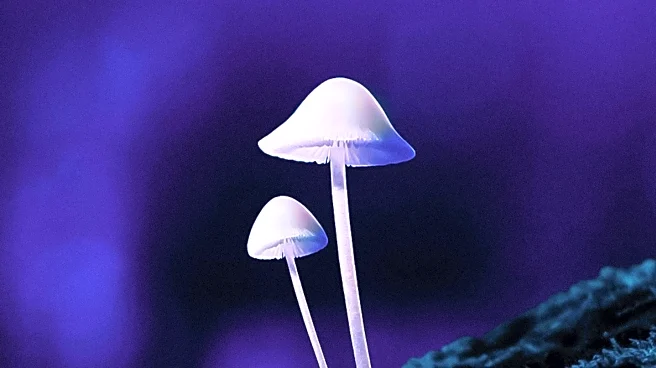What is the story about?
What's Happening?
Recent research conducted at the University of Pennsylvania has demonstrated that a single dose of psilocybin can rapidly and sustainably alleviate symptoms of chronic pain in mouse models. The study involved C57/BL6 male mice aged 8-12 weeks, which were subjected to sciatic nerve injury (SNI) or inflammatory pain models using complete Freund's adjuvant (CFA). Psilocybin treatment was found to reverse affective-related behaviors and motor function deficits in these mice, while sham/saline controls showed no change. Behavioral tests such as the elevated plus maze and von Frey testing were used to assess anxiety, depression, and mechanical allodynia. The research highlights psilocybin's potential as a therapeutic agent for chronic pain, with implications for future studies in human subjects.
Why It's Important?
The findings from this study are significant as they suggest psilocybin could be a viable treatment option for chronic pain, a condition affecting millions of people worldwide. Chronic pain often leads to anxiety and depression, impacting quality of life and increasing healthcare costs. Psilocybin's ability to alleviate these symptoms in preclinical models indicates potential for broader applications in pain management and mental health treatment. This research could pave the way for new therapeutic strategies, reducing reliance on opioids and other pain medications that carry risks of addiction and side effects.
What's Next?
Further research is needed to explore psilocybin's effects in human subjects, including clinical trials to assess safety, efficacy, and optimal dosing. Regulatory approval would be required before psilocybin could be used in clinical settings for pain management. Additionally, understanding the mechanisms by which psilocybin alleviates pain and affective symptoms could lead to the development of new drugs targeting similar pathways. Stakeholders such as pharmaceutical companies, healthcare providers, and policymakers will likely be involved in discussions about integrating psychedelic treatments into mainstream medicine.
Beyond the Headlines
The use of psychedelics like psilocybin in medicine raises ethical and legal questions, particularly concerning regulation and access. As research progresses, there may be cultural shifts in the perception of psychedelics, moving from recreational use to recognized medical treatments. Long-term studies will be crucial to understanding potential side effects and ensuring responsible use. The integration of psychedelics into healthcare could also influence public policy, requiring updates to drug classification and healthcare guidelines.














